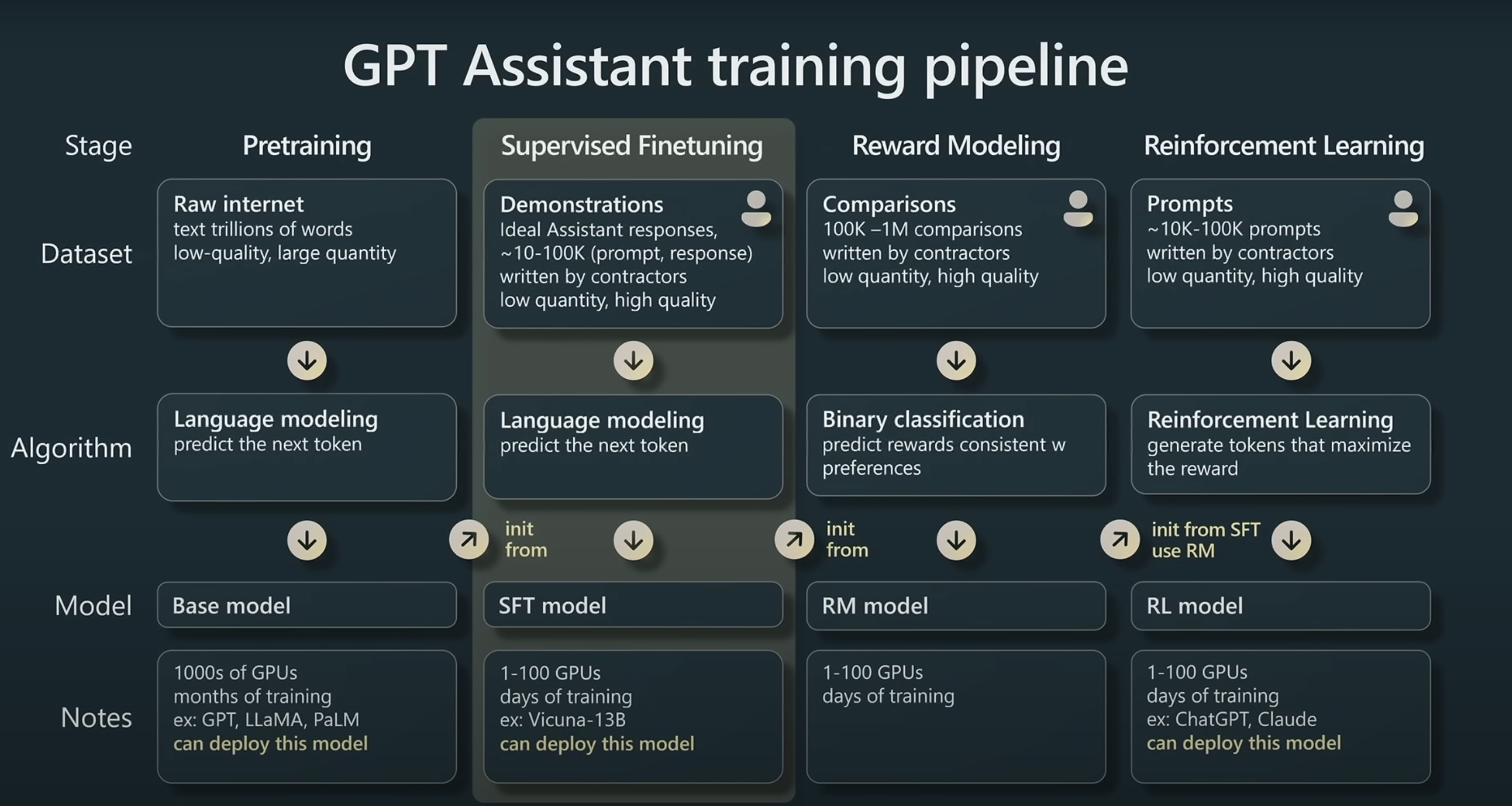Supervised finetuning of instruction-following Large Language Models (LLMs)
This repo contains demos for supervised finetuning (sft) of large language models, like Meta's llama-2. In particular, we focus on tuning for short-form instruction following capabilities.
Table of contents
Instruction-tuning background
The goal of instruction-tuning is to build LLMs that are capable of following natural language instructions to perform a wide range of tasks. The below was captured from the "State of GPTs" talk by Andrej Karpathy. The key points illustrated for sft:
- Collect small but high-quality datasets in the form of prompt and ideal responses.
- Do language modeling on this data, nothing changes algorithmically from pretraining.
- After training we get an sft model which can be deployed as assistants (and it works to some extent).
For more background, see any number of excellent papers on the subject, including Self-Instruct (2023), Orca (2023), and InstructGPT (2022).
Finetuned models
See the src/sft folder for all finetuning runs.
The below models correspond to peft adapters from QLoRA finetuning. These models are aimed at general instruction-following capabilities. See the QLoRA paper and the peft repository for more information on parameter-efficient sft.
- dfurman/Mixtral-8x7B-Instruct-v0.1
- dfurman/Mistral-7B-Instruct-v0.2
- dfurman/Falcon-180B-Instruct-v0.1
- dfurman/Llama-2-70B-Instruct-v0.1
- Note: This model was ranked 6th on 🤗's Open LLM Leaderboard in Aug 2023
- dfurman/Llama-2-13B-Instruct-v0.2
Basic inference
Note: Use the code below to get started with the sft models herein, as ran on 1x A100 (40 GB SXM). See here for the implementation in a notebook.
dfurman/Mixtral-8x7B-Instruct-v0.1
Setup
!pip install -q -U transformers peft torch accelerate einops sentencepiece bitsandbytesimport torch
from peft import PeftModel, PeftConfig
from transformers import (
AutoModelForCausalLM,
AutoTokenizer,
BitsAndBytesConfig,
)peft_model_id = "dfurman/Mixtral-8x7B-Instruct-v0.1"
config = PeftConfig.from_pretrained(peft_model_id)
tokenizer = AutoTokenizer.from_pretrained(
peft_model_id,
use_fast=True,
trust_remote_code=True,
)
bnb_config = BitsAndBytesConfig(
load_in_4bit=True,
bnb_4bit_quant_type="nf4",
bnb_4bit_compute_dtype=torch.bfloat16,
)
model = AutoModelForCausalLM.from_pretrained(
config.base_model_name_or_path,
quantization_config=bnb_config,
torch_dtype=torch.bfloat16,
device_map="auto",
trust_remote_code=True,
)
model = PeftModel.from_pretrained(
model,
peft_model_id
)messages = [
{"role": "user", "content": "Tell me a recipe for a mai tai."},
]
print("\n\n*** Prompt:")
input_ids = tokenizer.apply_chat_template(
messages,
tokenize=True,
return_tensors="pt",
)
print(tokenizer.decode(input_ids[0]))
print("\n\n*** Generate:")
with torch.autocast("cuda", dtype=torch.bfloat16):
output = model.generate(
input_ids=input_ids.to("cuda"),
max_new_tokens=1024,
return_dict_in_generate=True,
)
response = tokenizer.decode(
output["sequences"][0][len(input_ids[0]):],
skip_special_tokens=True
)
print(response)Outputs
"""
*** Prompt:
<s> [INST] Tell me a recipe for a mai tai. [/INST]
*** Generate:
1.5 oz light rum
2 oz dark rum
1 oz lime juice
0.5 oz orange curaçao
0.5 oz orgeat syrup
In a shaker filled with ice, combine the light rum, dark rum, lime juice, orange curaçao, and orgeat syrup. Shake well.
Strain the mixture into a chilled glass filled with fresh ice.
Garnish with a lime wedge and a cherry.
"""Evaluation
See the src/eval folder for all evaluation runs.
We evaluate models herein on 6 key benchmarks using the Eleuther AI Language Model Evaluation Harness, a unified framework to test generative language models.
(coming)
| Metric | Value w/o Prompt Formatting | Value w/ Prompt Formatting |
|---|---|---|
| Avg. | ||
| ARC (25-shot) | ||
| HellaSwag (10-shot) | ||
| MMLU (5-shot) | ||
| TruthfulQA (0-shot) | ||
| Winogrande (5-shot) | ||
| GSM8K (5-shot) |
(coming)
| Metric | Value w/o Prompt Formatting | Value w/ Prompt Formatting |
|---|---|---|
| Avg. | ||
| ARC (25-shot) | 60.24 | |
| HellaSwag (10-shot) | ||
| MMLU (5-shot) | ||
| TruthfulQA (0-shot) | ||
| Winogrande (5-shot) | ||
| GSM8K (5-shot) |
- Precision: bfloat16
- Run date: 10/27/23
- Run using this version of lm eval
| Metric | Value | Open LLM Leaderboard |
|---|---|---|
| Avg. | 65.10 | 65.71 |
| ARC (25-shot) | 63.57 | 63.14 |
| HellaSwag (10-shot) | 84.64 | 84.88 |
| MMLU (5-shot) | 59.77 | 60.78 |
| TruthfulQA (0-shot) | 66.78 | 68.26 |
| Winogrande (5-shot) | 73.72 | 77.19 |
| GSM8K (5-shot) | 42.15 | 40.03 |
Base models and datasets
We finetune off of the following base models in this repo:
We use the following datasets in this repo:
- ehartford/dolphin
- jondurbin/airoboros-2.2.1
- garage-bAInd/Open-Platypus
- timdettmers/openassistant-guanaco



